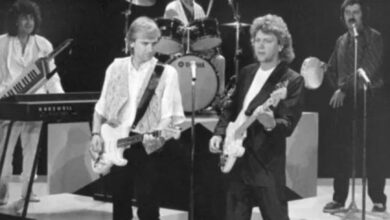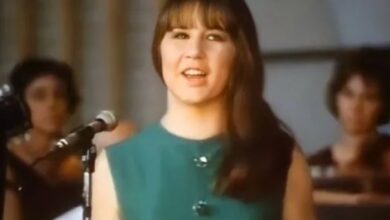The Zombies’ “Time of the Season” Becomes a Psychedelic Anthem and Late-Blooming Classic in 1968
Released in 1968, “Time of the Season” by The Zombies arrived like a gentle echo in a year defined by chaos, rebellion, and experimentation. With its hypnotic rhythm, hushed vocals, and eerie, call-and-response structure, the track didn’t just reflect the spirit of the era—it preserved it in sound. Though it initially went unnoticed in the UK and underwhelmed at first in the U.S., it later surged up the American charts to become a surprise Top 10 hit in 1969. Over time, it evolved into a quintessential psychedelic anthem, embodying both the dreamy optimism and fragile uncertainty that defined the tail end of the 1960s.
The Zombies had already made their mark in the British Invasion with hits like “She’s Not There” and “Tell Her No.” Formed in St Albans, England, in 1961, the group stood apart from their peers. While other bands leaned on blues riffs and brash vocals, The Zombies approached pop with jazz sensibilities, baroque arrangements, and restrained vocal performances. Keyboardist Rod Argent and lead singer Colin Blunstone served as the creative anchors—Argent with his compositional sophistication and Blunstone with his airy, breathy delivery that seemed suspended in another world.
“Time of the Season” was written by Rod Argent during the sessions for the band’s second and final studio album, Odessey and Oracle. The song was conceived at a time when The Zombies were already unraveling. Tensions within the group, financial strain, and frustration with their record label loomed large. Argent drew lyrical inspiration from the Summer of Love ethos still lingering in the cultural air, but he crafted a song that felt more introspective than celebratory. “What’s your name? Who’s your daddy?” wasn’t a pickup line—it was a veiled meditation on identity and inheritance during a time of transformation.
The track was recorded at Abbey Road Studios in 1967, just weeks after The Beatles wrapped up Sgt. Pepper’s Lonely Hearts Club Band. The atmosphere was ripe for experimentation, and Argent took full advantage of the studio’s resources. Using a Vox Continental organ, he constructed the now-iconic riff—part trance, part groove—which gave the song its hypnotic foundation. The breathy, conversational vocals from Blunstone offered a stark contrast to the usual psychedelic bombast of the day. Rather than push for volume, the song whispered, inviting listeners into its groove like a secret.
Ironically, upon its release, the song fell flat in the UK and received little fanfare in the United States. The Zombies had already disbanded by the time it started climbing the charts in early 1969, propelled by underground radio and growing demand in the U.S. It eventually peaked at No. 3 on the Billboard Hot 100, giving the band their biggest American success. The irony was not lost on the group—by the time they had their greatest hit, they no longer existed.
Culturally, “Time of the Season” became a touchstone for the psychedelic era, though it didn’t rely on the usual sonic tropes. There were no screaming guitars or overloaded effects pedals—just a haunting sense of space and rhythm. It captured a more introspective, sensual side of psychedelia, aligning more closely with the spiritual and poetic undercurrents of the late 1960s. It was a song for twilight, not for protest marches or festivals.
The unexpected success of the song brought renewed attention to Odessey and Oracle, which had been largely ignored upon release. Critics began reevaluating the album, eventually hailing it as one of the most innovative and beautiful records of the psychedelic period. For The Zombies, it was a bittersweet moment—validation arriving after the curtain had already closed. Still, the song’s popularity opened doors for the surviving members to pursue solo projects and future reunions.
Its influence can be felt in the works of artists who followed, particularly those who embraced subtlety over spectacle. Bands like Air, The Flaming Lips, and even Tame Impala have drawn from its dreamy, syncopated style. “Time of the Season” helped show that psychedelic rock didn’t need to scream—it could float, drift, and linger.
Over the decades, the song has been covered, sampled, and reinterpreted by a wide range of artists, from hip-hop producers to indie rockers. Eminem used a portion of the song in his track “Rhyme or Reason,” and its unmistakable bass line and organ riff have appeared in film soundtracks and television series, often deployed to evoke a mood of wistful retrospection or swirling nostalgia.
Around the time the song finally found success, Colin Blunstone had already stepped away from music, working in insurance before slowly returning to the studio in the 1970s. Rod Argent, meanwhile, formed his own band, Argent, and achieved chart success with songs like “Hold Your Head Up.” Yet “Time of the Season” remained a defining chapter—an echo from a project that was almost lost to time.
Its long-term legacy is undeniable. It continues to feature in documentaries, playlists, and retrospectives about the 1960s, often cited as one of the era’s most enduring and enigmatic tracks. Despite its late bloom, it has become one of the Zombies’ most recognizable and celebrated works, alongside “She’s Not There.” In 2019, the band was inducted into the Rock & Roll Hall of Fame, with this song standing as a testament to their timeless appeal.
The track also helped shape how music historians view commercial failure. It’s a case study in how timing, radio, and cultural shifts can breathe life into a song long after its creators have moved on. “Time of the Season” demonstrated that art sometimes needs the right moment to bloom—and that moment isn’t always when the ink dries on a record contract.
More than five decades later, “Time of the Season” remains a song out of time—ethereal, seductive, and strangely eternal. For a band that was already fading when it was released, the song became a kind of resurrection. For the world, it captured a fleeting moment when everything seemed on the verge of change.
Ultimately, it’s a song that refuses to be forgotten. Like a memory that resurfaces in a quiet moment, “Time of the Season” drifts through the decades, still asking that curious, whispered question: “What’s your name? Who’s your daddy?” And in doing so, it reminds us that even the most subtle voices can leave the deepest echoes.





